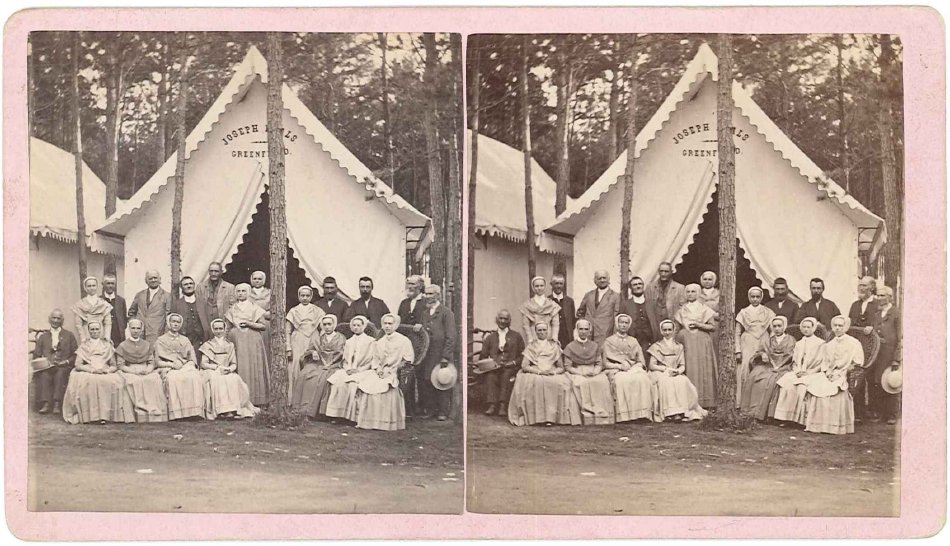
“Lake Pleasant Camp-Meeting,” Montague, MA, 1880, Frank Crosier, Readsboro, VT, photographer, Shaker Museum | Mount Lebanon: 1951.4407.1.
The Shakers were no strangers to the concept of camp meetings. In the early days of the Shaker Church they saw such meetings – then usually very much of a religious nature – as an opportunity to testify about the Shaker faith and Shaker life with the hope of finding potential converts. As religious revivals […]
The Shakers were no strangers to the concept of camp meetings. In the early days of the Shaker Church they saw such meetings – then usually very much of a religious nature – as an opportunity to testify about the Shaker faith and Shaker life with the hope of finding potential converts. As religious revivals burned through the Taconic Hills on the Massachusetts / New York border and later in the western part of New York State, the Shakers often sent missionaries to witness the work that was going on and to see if there was an opening for them to step forward and present themselves and their message of salvation. When the Great Kentucky Revival camp meetings at Cane Ridge, Kentucky, took hold in the early 1800s, Mother Lucy Wright sent three missionaries to what was then considered the West to preach the Shaker gospel to those gathered there. This effort resulted in a half-dozen Shaker communities being founded in Ohio and Kentucky.
In later years, camp meetings still retained a religious tone but began to stray beyond the strictly holy. Seventh-day Adventist camp meetings promoted vegetarianism and served only vegetarian meals. The camp meetings on Lake Chautauqua, New York, which started as Methodist meetings in the 1870s, soon evolved into a formal slate of lectures and performances that continue today. Pacifists gathered by the thousands outdoors in the pine groves of Salt Point, New York, to report on and discuss progress in the peace movement. The Shakers, proponents of many progressive movements, were particularly interested in the Spiritualists. The Shakers received messages from Mother Ann Lee and other departed leaders during the Era of Manifestations from the 1830s through the 1850s, and they believed this gave them a unique advantage in finding converts within the Spiritualist movement of the later 19th century.
In 1870 a camp meeting ground with 75 tent lots was established on the shore of Lake Pleasant, in the town of Montague, Massachusetts, and by 1872 it had become a favorite meetings place for Spiritualists. In 1874 Henry Buddington and Joseph Beals organized the New England Spiritualist Campmeeting Association. New cabins were built and more tenting lots created, and by August 1900 the population of the meeting ground could reach as high as 2,000 people.

“Spiritualist’ and Liberalists’ Camp-Meeting. Lake Pleasant. Montague, Mass. August 4th. To August 30th. 1875,” Springfield, MA: G. E. Lyman & Co., Printers, 1875, Shaker Museum | Mount Lebanon: 2009.12.1.
The advertising flyer pictured here promoted the 1875 season. The description promised “a large Pavilion with tight roof, polished floor, open sides, built for dancing parties, dining salons, refreshment stands, boats, swings, bathing houses for ladies, sequestered walks by the Lake, artesian wells, affording soft, pure, cool, water; overlooking the auditorium, a bluff on which the tents are placed, under pine trees, … free from mosquitoes …” With this kind of promotion it seems an unlikely place for the Shakers to venture, but venture they did. In 1879, Elder Frederick Evans and Brother Emil Bretzner from Mount Lebanon’s North Family attended the camp and the next year a rather large contingent of Shakers from Mount Lebanon and Watervliet, New York, and Harvard, Massachusetts – 34 Shakers in all, went to Lake Pleasant. At the meeting on Wednesday, August 18, noted spiritual medium, Emma Hardinge Britten, reported, “The Shakers were present in force, and conducted the exercises both morning and afternoon. Elder Evans, Eldress Doolittle, and other members of the party spoke. The singing was a novel portion of the exercises. Elder Evans is a radical speaker, and some of his remarks were loudly applauded. The audiences were very large during the day.”

“Lake Pleasant Camp-Meeting,” Montague, MA, 1880, Frank Crosier, Readsboro, VT, photographer, Shaker Museum | Mount Lebanon: 1951.4407.1.
This photograph, taken in front of Joseph Beals’s tent, shows 20 of the Shakers who traveled to Lake Pleasant. Beals, one of the founders of the camp meetings, was a dentist and amateur photographer. Whether his tent was merely his August residence, a dental office, or a photographic studio is not known, but it is interesting that the photographer, Frank Crosier from Readsboro, Vermont, chose to take his picture of the Shakers in front of another photographer’s tent. While a number of Shakers are identifiable in the photograph – Elder Daniel Offord, Brother Orren Haskins, Sister Martha Anderson, Elder William Anderson, Brother Charles Greaves, Elder Amos Stewart, Elder Timothy Rayson, and one of the Sizer brothers – noticeably absent are Elder Frederick Evans and Eldress Antoinette Doolittle who we might guess were off lecturing the crowd.